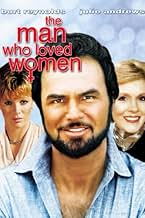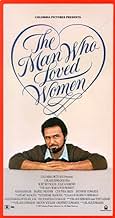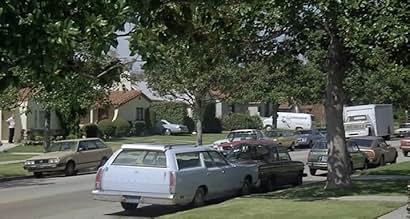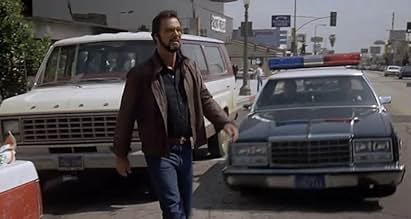IMDb RATING
5.3/10
2.7K
YOUR RATING
A womanizing sculptor named David goes to seek help from a psychiatrist, Marianna, to cure him of his obsession with women.A womanizing sculptor named David goes to seek help from a psychiatrist, Marianna, to cure him of his obsession with women.A womanizing sculptor named David goes to seek help from a psychiatrist, Marianna, to cure him of his obsession with women.
Cynthia Sikes Yorkin
- Courtney
- (as Cynthia Sikes)
Herb Tanney
- Doctor
- (as Schweitzer Tanney)
Featured reviews
Here is a picture that, for every conceivable reason, shouldn't work -- but on a purely emotional level, it does. Most viewers could be easily misled (and disappointed) by expecting a light romantic comedy or a wild sex farce. Instead, Blake Edwards and his co-screenwriters offer something entirely different, a picture far more complex, meaningful, and thought-provoking than what we might anticipate.
"The Man Who Loved Women" tells a sad, sad story about a middle-aged man (Burt Reynolds in one of his finest performances, as David Fowler) who drowns in isolation thanks to a rare ability: he's forced and driven, by instinct, to glimpse the sacredness and inner beauty of almost every woman he encounters. Yes, on some levels, his circumstances lead to a hedonistic paradise. But his feelings also prevent him from ever making a commitment, and isolate him from the joy of knowing one woman exclusively.
For that reason, a melancholic canopy hangs over the entire film and takes the front seat to humour. The story begins with David Fowler's death, and every event we witness onscreen is tinged by our knowledge that Fowler's obsession with women will eventually kill him. A slow, heavy, stringed theme song, Mancini's "Little Boys", plays softly throughout the film, and Fowler's words (in voice-over narration) constantly remind us of the deep, incurable loneliness that plagues him.
All of this might sound heavy-handed -- and it very well could be, if it weren't for the sexual fantasy and wild Edwards comedy that flesh out the story and provide relief. The melancholia and comedy work together, and Edwards achieves a delicate balance of mood --a bittersweet aura.
I've heard one criticism (see Ebert's review) that many of the story's psychological elements are impossible. Though a few scenes might suffer from exaggeration (hundreds and HUNDREDS of women attend David's funeral), one could easily dismiss the story -- as I did, at first --because so many male viewers *lack* Fowler's ability to care for women unconditionally; we want to believe that it's impossible for a contemporary Don Juan to exist. But that simply isn't tenable. My own theory about the film -- (and it's just a theory) -- is that Edwards may have pulled inspiration for Fowler from the late John Derek, another man worshipped and adored by women, who interacted with Edwards during the filming of "10" (1979).
Edwards and his co-writers lend a gentle touch to the film by crafting Fowler's character against-the-grain; while we might expect a narcissistic hedonist, he's just the opposite -- a warm, gentle, soul with only the sincerest motives. It's easy to understand why women are attracted to Fowler, from his first appearance onscreen. And, oddly -- male viewers may never begrudge Fowler his affairs, only applaud -- because his narration and his gentle spirit confirm the fact that he really does worship and adore everything about the girls who walk in and out of his life. "I keep thinking," he says sadly, "about all the women I'm never gonna know..."
In one of the film's most revealing and effective moments, Edwards allows us to glimpse a woman, at the funeral, who is the complete opposite of a "10" -- fat, homely, depressed -- undesirable. We have the distinct impression that her external appearance didn't matter to Fowler -- that he only looked into her heart and perceived her beauty. It lends credibility to psychologist Marianna's (Julie Andrews) observation: that David did, indeed, love all of the girls, equally and unconditionally.
"The Man Who Loved Women" tells a sad, sad story about a middle-aged man (Burt Reynolds in one of his finest performances, as David Fowler) who drowns in isolation thanks to a rare ability: he's forced and driven, by instinct, to glimpse the sacredness and inner beauty of almost every woman he encounters. Yes, on some levels, his circumstances lead to a hedonistic paradise. But his feelings also prevent him from ever making a commitment, and isolate him from the joy of knowing one woman exclusively.
For that reason, a melancholic canopy hangs over the entire film and takes the front seat to humour. The story begins with David Fowler's death, and every event we witness onscreen is tinged by our knowledge that Fowler's obsession with women will eventually kill him. A slow, heavy, stringed theme song, Mancini's "Little Boys", plays softly throughout the film, and Fowler's words (in voice-over narration) constantly remind us of the deep, incurable loneliness that plagues him.
All of this might sound heavy-handed -- and it very well could be, if it weren't for the sexual fantasy and wild Edwards comedy that flesh out the story and provide relief. The melancholia and comedy work together, and Edwards achieves a delicate balance of mood --a bittersweet aura.
I've heard one criticism (see Ebert's review) that many of the story's psychological elements are impossible. Though a few scenes might suffer from exaggeration (hundreds and HUNDREDS of women attend David's funeral), one could easily dismiss the story -- as I did, at first --because so many male viewers *lack* Fowler's ability to care for women unconditionally; we want to believe that it's impossible for a contemporary Don Juan to exist. But that simply isn't tenable. My own theory about the film -- (and it's just a theory) -- is that Edwards may have pulled inspiration for Fowler from the late John Derek, another man worshipped and adored by women, who interacted with Edwards during the filming of "10" (1979).
Edwards and his co-writers lend a gentle touch to the film by crafting Fowler's character against-the-grain; while we might expect a narcissistic hedonist, he's just the opposite -- a warm, gentle, soul with only the sincerest motives. It's easy to understand why women are attracted to Fowler, from his first appearance onscreen. And, oddly -- male viewers may never begrudge Fowler his affairs, only applaud -- because his narration and his gentle spirit confirm the fact that he really does worship and adore everything about the girls who walk in and out of his life. "I keep thinking," he says sadly, "about all the women I'm never gonna know..."
In one of the film's most revealing and effective moments, Edwards allows us to glimpse a woman, at the funeral, who is the complete opposite of a "10" -- fat, homely, depressed -- undesirable. We have the distinct impression that her external appearance didn't matter to Fowler -- that he only looked into her heart and perceived her beauty. It lends credibility to psychologist Marianna's (Julie Andrews) observation: that David did, indeed, love all of the girls, equally and unconditionally.
THE MAN WHO LOVED WOMEN begins with a sculptor roaming around LA trying to find out what makes women tick. The sculptor is played by Burt Reynolds, one of the biggest movie stars in the world, so I guess the women will pay attention. Actually, the movie begins with his funeral and we see woman after woman in all shapes and sizes, roaming up the cemetery grass to pay tribute to this guy.
Now any movie with an opening like this had better feature one helluva guy so we immediately cut to the scenes of Burt seducing woman after woman, while providing some tender advice on life to keep them warm when he's gone in the morning. I really liked Burt Reynolds performance in this movie. He shows in this movie that when he wants to he can be a fine actor. We know Burt Reynolds has an amazing screen presence but it's nice to see him in a movie where he doesn't wink at the camera to show us how much fun he's having. His scenes with the feminist shrink(Julie Andrews) are funny as Reynolds exhibits every male symptom in the book. The women are Cynthia Sikes, Marila Henner and Kim Basinger to name a few, and rest assured that they're all(especially Basinger)very beautiful.
If the movie had stayed true to this idea it might've been special.but it degenerates into a series of three's company set ups and grows tired. After Basinger stirs Reynolds interest they have a romp in her husband's condo. The husband arrives and Reynolds must lurch around. I couldn't count how many scenes there were like that. It's at this point we realize the movie isn't going to be as incisive as it promised. It's silly how Reynolds keeps getting into the same situation with the jealous husband and not very funny either, not even when he say, glues his hands to the steering wheel.
Another major problem is the chemistry between Reynolds and Andrews. There's no heat between them and I suspect that maybe they didn't get along with each other on the set. This isn't the type of a man she'd go out with, canon of ethics aside. It's awkward at the end when Andrews drops everything to join Reynolds on vacation when we don't even believe he's gotten to first base. I can't quite recommend THE MAN WHO LOVED WOMEN, it's just not true to itself. The movie introduces us to an interesting man looking to make real discoveries and ends up with a bunch of people who aren't right for each other.
DG
STAR STAR (out of four)
Now any movie with an opening like this had better feature one helluva guy so we immediately cut to the scenes of Burt seducing woman after woman, while providing some tender advice on life to keep them warm when he's gone in the morning. I really liked Burt Reynolds performance in this movie. He shows in this movie that when he wants to he can be a fine actor. We know Burt Reynolds has an amazing screen presence but it's nice to see him in a movie where he doesn't wink at the camera to show us how much fun he's having. His scenes with the feminist shrink(Julie Andrews) are funny as Reynolds exhibits every male symptom in the book. The women are Cynthia Sikes, Marila Henner and Kim Basinger to name a few, and rest assured that they're all(especially Basinger)very beautiful.
If the movie had stayed true to this idea it might've been special.but it degenerates into a series of three's company set ups and grows tired. After Basinger stirs Reynolds interest they have a romp in her husband's condo. The husband arrives and Reynolds must lurch around. I couldn't count how many scenes there were like that. It's at this point we realize the movie isn't going to be as incisive as it promised. It's silly how Reynolds keeps getting into the same situation with the jealous husband and not very funny either, not even when he say, glues his hands to the steering wheel.
Another major problem is the chemistry between Reynolds and Andrews. There's no heat between them and I suspect that maybe they didn't get along with each other on the set. This isn't the type of a man she'd go out with, canon of ethics aside. It's awkward at the end when Andrews drops everything to join Reynolds on vacation when we don't even believe he's gotten to first base. I can't quite recommend THE MAN WHO LOVED WOMEN, it's just not true to itself. The movie introduces us to an interesting man looking to make real discoveries and ends up with a bunch of people who aren't right for each other.
DG
STAR STAR (out of four)
Seriocomic portrait of a middle-aged teenager. In the 1960s and 1970s, there were a slate of films about sensitive men who "loved" women. Sad attempts by so-called enlightened men to justify how their raging libidos were not at odds with them being feminists. They weren't womanizers, you see. They just loved women so much they couldn't stop at one. The Reese's peanut butter cups approach to adult relationships. Gene Siskel used to really love these types of films. It did not shock me to learn he gave this film three out of four stars.
This is a remake of a 70s film I haven't seen. It already feels like a relic by 1983. Blake Edwards, a director I've never been particularly enamored of outside of Breakfast at Tiffany's, can't seem to decide if we are to take this dreck seriously or not. The film introduces us to our horndog hero, played by Burt Reynolds who at this time was desperate to get away from success and achieve that which all box office stars seek eventually - "to be taken seriously as an AK-TOR!" What follows is an eyerollathon of good looking adults flirting with the finesse of children. There's sex, even some brief nudity from Marilu Henner, but the movie is never sexy. Nor is it fun. It certainly never approaches anything resembling funny. It's a slow, dry exercise in trying to provide sophistication and depth to Andy Hardy. Still, this is Burt before his mid-80s accident that he never fully recovered from. Whatever charms the movie has comes entirely from him.
This is a remake of a 70s film I haven't seen. It already feels like a relic by 1983. Blake Edwards, a director I've never been particularly enamored of outside of Breakfast at Tiffany's, can't seem to decide if we are to take this dreck seriously or not. The film introduces us to our horndog hero, played by Burt Reynolds who at this time was desperate to get away from success and achieve that which all box office stars seek eventually - "to be taken seriously as an AK-TOR!" What follows is an eyerollathon of good looking adults flirting with the finesse of children. There's sex, even some brief nudity from Marilu Henner, but the movie is never sexy. Nor is it fun. It certainly never approaches anything resembling funny. It's a slow, dry exercise in trying to provide sophistication and depth to Andy Hardy. Still, this is Burt before his mid-80s accident that he never fully recovered from. Whatever charms the movie has comes entirely from him.
In the style of STARTING OVER, Burt took on another romantic lead in 1983's THE MAN WHO LOVED WOMEN, which starred Reynolds as a confirmed bachelor whose obsession with the opposite sex has driven him into therapy with a female shrink of course (Julie Andrews in a low-key performance). Though not as good as his performance in STARTING OVER, Reynolds does exude a great deal of charm in this film and get solid support from Andrews, Marilu Henner, and in an early and very amusing role, Kim Basinger as the undersexed trophy wife of a wealthy Texan (Barry Corbin)who likes her sex with an element of danger. This comedy that was co-written by Blake Edwards and his own psychiatrist is worth a look.
I just saw The Man Who Loved Women, and I found it to be a rather delightful movie. It's a plot you don't see to often; it's focused on one man and his love of women. The movie may seem pointless, but you'll get it once you see the ending. I won't ruin it here, but it was kind of depressing and unexpected, and looking back on the movie, I enjoyed it much more afterwards than during. It's not the most exciting movie. You won't see any amazing or dynamic cinematography or camera angles that are all to creative. In fact, it seems more like a movie from the '70's than 1983 in the way it was filmed, but if you like the kind of movies that you enjoy much more after having looked back on everything, I think you'll find this a rather enjoyable work.
Did you know
- TriviaThis movie, a remake, was released six years after François Truffaut's source French movie L'homme qui aimait les femmes (1977).
- GoofsWhen Julie Andrews unwraps the book on the plane, the front cover is visible before she flips it over to face her, but then when it is shown from her point of view, it looks completely different.
- Quotes
Agnes Chapman: You're a fast worker. I better leave before one of us gets pregnant.
David Fowler: I'm not that fast.
- SoundtracksLittle Boys (theme song)
Music by Henry Mancini
Lyrics by Alan Bergman & Marilyn Bergman
[Played over the closing credits]
Performed by Helen Reddy
- How long is The Man Who Loved Women?Powered by Alexa
Details
- Release date
- Country of origin
- Official site
- Languages
- Also known as
- The Man Who Loved Women
- Filming locations
- Houston, Texas, USA(Texas scenes.)
- Production companies
- See more company credits at IMDbPro
Box office
- Budget
- $12,000,000 (estimated)
- Gross US & Canada
- $10,964,740
- Opening weekend US & Canada
- $1,347,032
- Dec 18, 1983
- Gross worldwide
- $10,964,740
- Runtime1 hour 50 minutes
- Sound mix
- Aspect ratio
- 1.85 : 1
Contribute to this page
Suggest an edit or add missing content


































